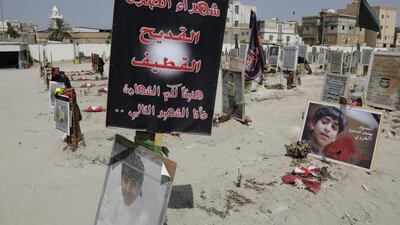It was a dramatic announcement that came from the Saudi ministry of interior on the first day of Eid Al Fitr.
More than 400 ISIL suspects had been arrested since the May bombing at a Shiite mosque in Al Qudeeh that killed 22 people. The ministry, which is headed by Crown Prince Mohammed bin Nayef, stated that multiple attacks had been thwarted and that these targeted other mosques, diplomatic areas and locations that included fish markets in the Eastern Province.
It was obvious that the announcement was meant to calm fears of extremist attacks during the holiday period.
The ministry has been working overtime to prevent ISIL attacks especially as the group tries to target disenfranchised youth using the internet and under the name "Najd Vilayet”.
This is significant in the context of what Najd means to Saudi Arabia. It is regarded as the birthplace of Saudi nationalism because it has never been subject to foreign conquest. For ISIL to use the name "Najd Vilayet" is a bold move that's meant to suggest that it is in control of Najd. The group has been using a mix of online and offline measures to recruit Saudi youth. It is active on social media – Twitter and YouTube – and in Taif, a city in the north-west, it fused the real world with the virtual. A video posted on YouTube showed ISIL slogans spray-painted on to government buildings.
It is engaged in other, smaller campaigns too. In Riyadh, last year, for instance, many drivers woke up to find ISIL leaflets stuffed into their car door handles, or slipped behind the windscreen wipers. And as with the Taif spray-painting, ISIL is increasingly using graffiti to spread the word.
So will the Eid arrests make a substantial difference to ISIL's presence in Saudi Arabia? Yes, but there are still concerns about possible recruitment in the north of the kingdom. This is where the central highland Najd region meets the Jordanian and Iraqi borders. Its location makes it particularly susceptible to ISIL’s geostrategic interests. It's worth remembering that not only has ISIL launched attacks on Saudi border towns such as Arar, it has also been able to target and take out General Oudah Al Belawi, commander of border operations in Saudi Arabia’s northern zone.
Although a fortified fence separates the kingdom Jordan and Iraq, ISIL can’t be kept out because, to use a metaphor more commonly used for disease outbreaks, it is airborne. Cities and towns in northern Saudi Arabia such as Rafha, Tareef Al Wajeh, Diba, Skaka, Dowmat Aljandal and Alqurayat are linked by tribe and family to parts of southeastern Jordan, southwestern Iraq and Kuwait.
Even if Saudi citizens are inoclated against ISIL's hateful ideology, tribalism may make it difficult to shut out the group entirely. There is some evidence of ISIL activity in the Saudi north and there is some reason to suspect that it is from within. This month, a shoot-out that killed high-level ISIL suspect, Yusuf Abdullatif Shabab Al Ghamdi in Taif, led to the discovery of ISIL flags, weapons, silencers and other materials from a raid on the house that he fled. Now, Saudi officials admit they fear attacks by ISIL with a focus on the north. Given that thousands of Saudi citizens have been fighting alongside ISIL, it was considered only a matter of time before those fighters returned to their country and launched attacks on it.
This is the context of the antiterrorism sweep on Eid. To be sure, the Saudi authorities are addressing the ISIL threat with vigour. And there seems to be a new determination to protect the northern part of the kingdom by means of special operation exercises and a concerted social media campaign.
It's clear that Saudi Arabia is anxious to let all its people know that everything that's being done is meant for the good of the entire kingdom.
Dr Theodore Karasik is a Dubai-based analyst on the Gulf with a specific focus on Saudi Arabia

